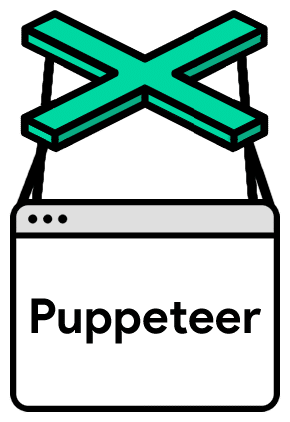Puppeteer is a powerful and versatile tool that has gained immense popularity among developers, web scrapers, and data extraction enthusiasts. In this article, we will delve into what Puppeteer is, its various applications, and why using proxy servers with Puppeteer can be a game-changer for your web scraping endeavors.
What is Puppeteer Used for and How Does it Work?
Puppeteer is a Node.js library developed by Google that provides a high-level API for controlling headless Chrome or Chromium browsers. This means it allows you to automate tasks within web browsers, such as opening pages, interacting with elements, taking screenshots, generating PDFs, and much more, all through a programmable interface.
Some common use cases of Puppeteer include:
-
Web Scraping: Puppeteer is widely used for scraping data from websites. It can navigate complex websites, interact with JavaScript-driven content, and extract the data you need efficiently.
-
Automated Testing: Developers use Puppeteer to write automated tests for web applications. It can simulate user interactions, like clicking buttons and filling forms, to ensure that web apps work correctly.
-
Performance Monitoring: Puppeteer can capture performance metrics of web pages, helping developers identify and optimize slow-loading elements.
-
Page Automation: Puppeteer can be used to automate repetitive tasks on web pages, such as submitting forms, taking screenshots, or generating PDFs.
Puppeteer achieves all this by controlling a headless browser instance, essentially a browser without a graphical user interface, allowing it to work in the background.
Why Do You Need a Proxy for Puppeteer?
Proxy servers play a crucial role when using Puppeteer, especially for web scraping and data extraction tasks. Here’s why you need a proxy for Puppeteer:
-
IP Rotation: Puppeteer’s web scraping activities can trigger anti-scraping mechanisms on websites, leading to IP bans or rate limiting. By using a proxy server, you can rotate your IP addresses, making it harder for websites to detect and block your scraping activity.
-
Geo-targeting: Some websites display different content or features based on the user’s location. With a proxy server, you can choose IPs from various locations, allowing you to access geo-restricted content or gather region-specific data.
-
Load Distribution: Puppeteer can be resource-intensive, and running multiple instances simultaneously can be taxing on your system. Using proxies, you can distribute your scraping tasks across multiple IP addresses and servers, improving efficiency and speed.
-
Anonymity: Proxies add a layer of anonymity to your web scraping activities. This is especially important if you’re collecting data from websites with privacy concerns or legal restrictions.
Advantages of Using a Proxy with Puppeteer
Utilizing proxy servers in conjunction with Puppeteer offers several advantages:
-
Scalability: Proxies enable you to scale your web scraping operations easily. You can distribute tasks across multiple proxies, allowing for faster data collection.
-
IP Diversity: With proxies, you can access websites from different IP addresses and locations, reducing the risk of being detected as a scraper.
-
Improved Reliability: In case one proxy IP gets blocked, you can switch to another, ensuring uninterrupted scraping operations.
-
Enhanced Privacy: Proxies mask your real IP address, providing an extra layer of privacy and security while scraping sensitive or restricted data.
What Are the Сons of Using Free Proxies for Puppeteer?
While free proxies may seem like an attractive option, they come with certain drawbacks when used with Puppeteer:
| Cons of Free Proxies | Explanation |
|---|---|
| Unreliability | Free proxies often have unstable connections and may become unavailable or slow down unexpectedly. |
| Limited Speed and Bandwidth | Free proxies typically offer limited speed and bandwidth, which can significantly slow down your scraping tasks. |
| Security Risks | Free proxies may not prioritize security, potentially exposing your data or system to vulnerabilities. |
| Higher Detection Risk | Websites are more likely to detect and block traffic from free proxies due to their widespread use. |
| Lack of Support | Free proxy providers rarely offer customer support, making it challenging to resolve issues. |
What Are the Best Proxies for Puppeteer?
When selecting proxies for Puppeteer, it’s essential to choose reliable and high-quality options. Here are some popular types of proxies that work well with Puppeteer:
-
Residential Proxies: These proxies use real IP addresses provided by Internet Service Providers (ISPs), offering excellent reliability and a lower detection risk.
-
Data Center Proxies: Data center proxies are fast and cost-effective. They are ideal for tasks that require speed and agility.
-
Rotating Proxies: Rotating proxies automatically switch IP addresses at regular intervals, reducing the risk of being blocked.
-
Proxy Pools: Services that offer a pool of diverse proxies can be an excellent choice, as they provide a range of IP addresses to choose from.
-
Proxy APIs: Some providers offer APIs for easy integration with Puppeteer, simplifying the proxy configuration process.
How to Configure a Proxy Server for Puppeteer?
Configuring Puppeteer to use a proxy server involves setting up the puppeteer.launch options. Here’s a basic example in Node.js:
javascriptconst puppeteer = require('puppeteer');
(async () => {
const browser = await puppeteer.launch({
args: ['--proxy-server=http://your-proxy-ip:port'],
});
const page = await browser.newPage();
// Your scraping code here
await browser.close();
})();
Replace 'http://your-proxy-ip:port' with the actual IP and port of your proxy server.
In conclusion, Puppeteer is a powerful tool for web scraping and automation, but its effectiveness can be greatly enhanced by using proxy servers. Proxies provide IP rotation, geo-targeting, and anonymity, making your scraping tasks more efficient and less prone to detection. However, it’s crucial to choose the right type of proxies to ensure reliability and performance in your Puppeteer projects.
If you’re looking for premium proxy services tailored to your specific needs, consider OneProxy. Our proxy servers are designed to work seamlessly with Puppeteer, providing you with the IP flexibility and performance required for successful web scraping and data extraction tasks. Explore our proxy offerings at oneproxy.pro and take your Puppeteer projects to the next level.













